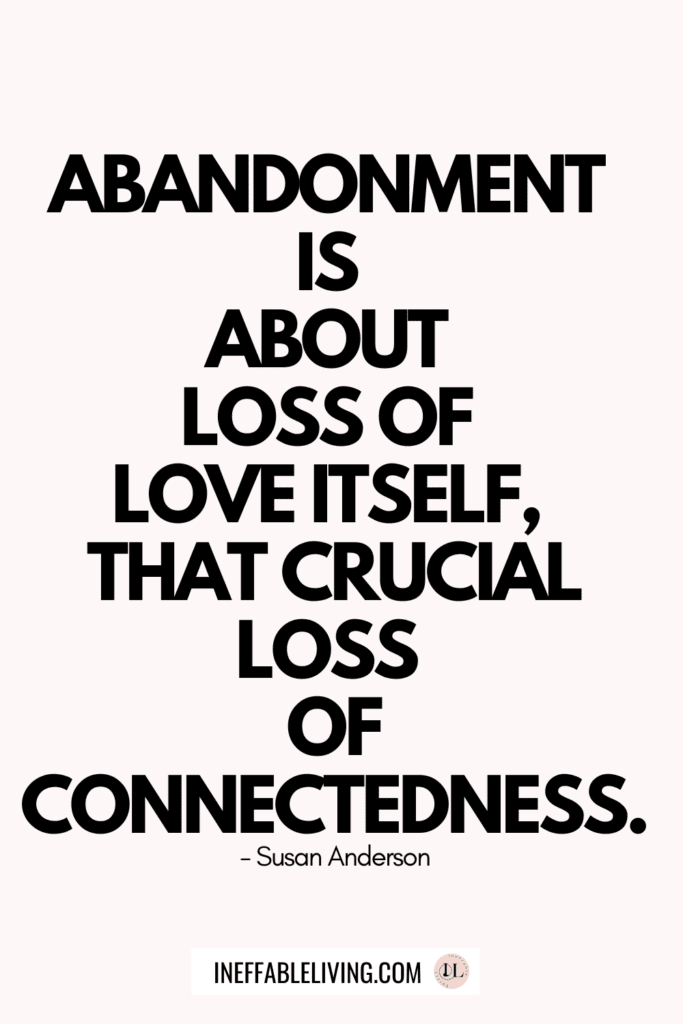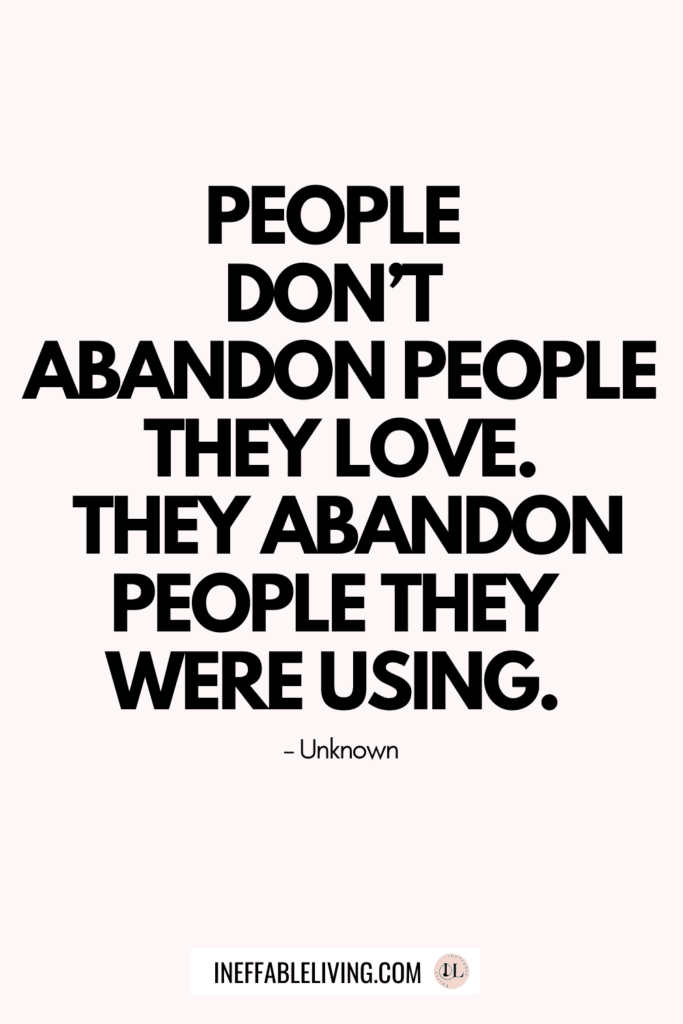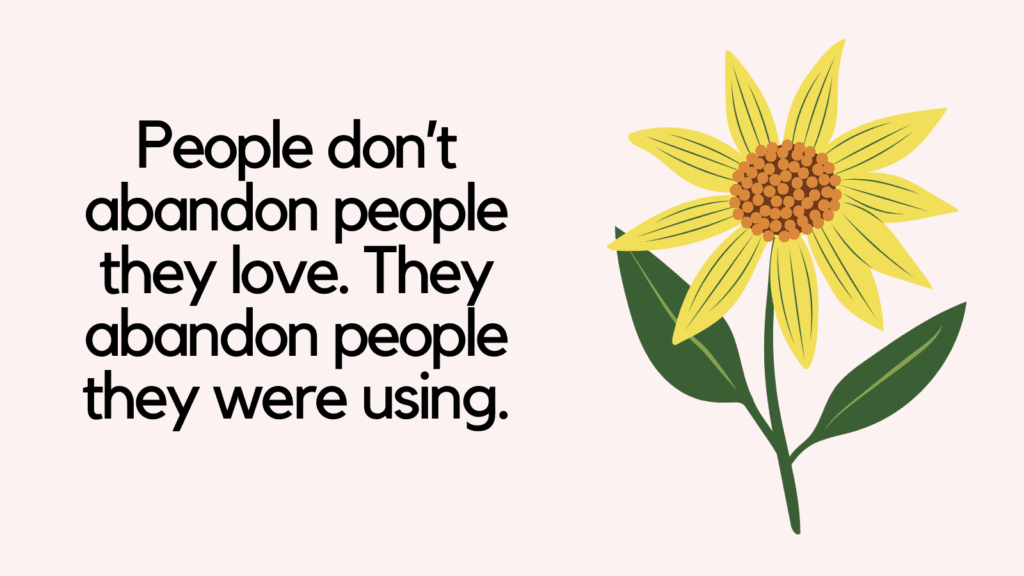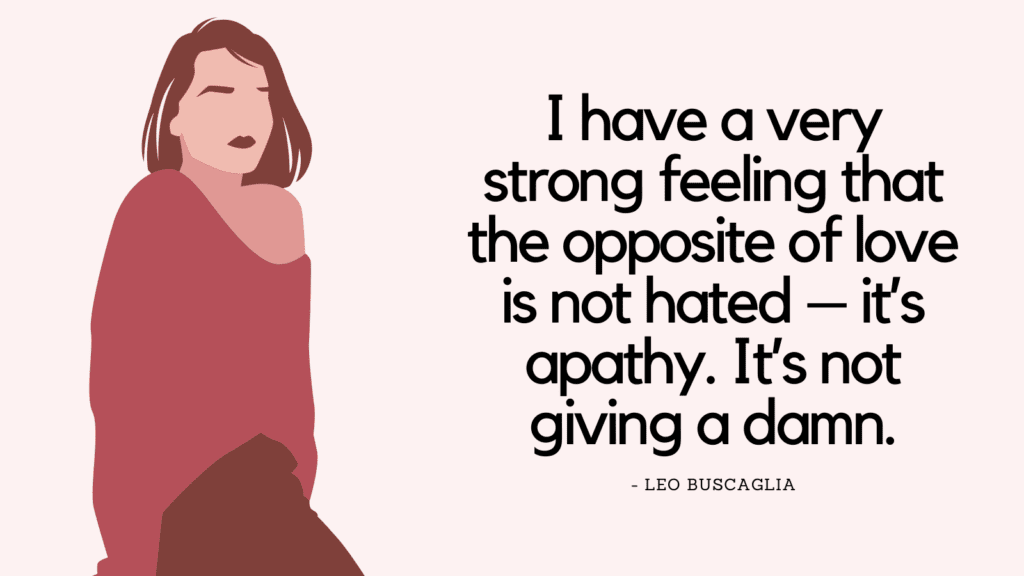This post contains some of the best fear of abandonment quotes.
What Is Fear Of Abandonment?
Fear of abandonment is a type of anxiety that can be caused by a past traumatic experience, such as a relationship ending abruptly, neglect or physical separation from a loved one.
It can also be caused by an insecure attachment style developed during childhood or other life events that impact our sense of security and trust in relationships.
People with a fear of abandonment often have an intense need for validation and reassurance from their partner, may become overly attached or clingy, and may feel anxious or distressed when separated from their loved ones.
This fear can lead to difficulty in forming healthy relationships, and may perpetuate a cycle of clingy behavior, anxiety, and relationship instability.
Therapy and other interventions can help individuals overcome this fear and develop more secure relationships.
Fear Of Abandonment Quotes
1. “When one is abandoned, one is left alone. This can happen through physical absence as well as physical presence. In fact to be abandoned by someone who is physically present is much more crazymaking. ” – John Bradshaw
2. “The fear of abandonment forced me to comply as a child, but I’m not forced to comply anymore. The key people in my life did reject me for telling the truth about my abuse, but I’m not alone. Even if the consequence for telling the truth is rejection from everyone I know, that’s not the same death threat that it was when I was a child. I’m a self-sufficient adult and abandonment no longer means the end of my life.” – Christina Enevoldsen

3. “If you leave someone at least tell them why, because what’s more painful than being abandoned; is knowing you’re not worth an explanation.” – Unknown
4. “People don’t abandon people they love. They abandon people they were using.” – Unknown
5. “If a fear of abandonment is part of your story then it’s likely that you feel trapped by your fear and the accompanying thoughts and emotions. You may also feel trapped by your behavioral reaction cycle—the automatic behaviors that you engage in when you’re dealing with the n
egative thoughts and emotions that your fear of abandonment triggers.” – Michelle Skeen
6. “The stage was set for your fear of abandonment by factors outside of your control. The story about your fear of abandonment (and additional core beliefs) is the result of factors that were present at your birth (temperament) and factors that were present in your environment. These are conditions that you couldn’t control as a child.”- Michelle Skeen
7. “The link between fear of abandonment and early attachment is powerful. But it is possible that even a securely attached child can develop a fear of abandonment core belief.”- Michelle Skeen
8. “But when we look at the characteristics of the caregiver of the avoidantly attached child—rejecting and harsh—it doesn’t take much to make the connection to the core belief of abandonment, mistrust and abuse, emotional deprivation, defectiveness, and failure.”- Michelle Skeen
9. “It’s likely that you struggle with fear of abandonment without an additional diagnosis, even though you may experience feelings of anxiety, depression, and panic when your fear of abandonment gets triggered.”- Michelle Skeen
Related: Abandonment Issues Quiz: Do I Have Abandonment Issues?
10. “With an abandonment core belief your thoughts may include: People who love me will leave me or die. No one has ever been there for me. The people I’ve been closest to are unpredictable. In the end I will be alone.”- Michelle Skeen
11. “As someone who struggles with an abandonment core belief, when you experience the slightest hint of rejection you will have thoughts predicting loss and abandonment. You can’t stop these thoughts—none of us can stop our thoughts from constantly popping up.”- Michelle Skeen
12. “Practicing self-compassion means softening your heart and distancing yourself from your inner critic and the negative statements that reinforce your fear of abandonment and feelings of unworthiness and inadequacy.”- Michelle Skeen
13. “With an abandonment core belief you know that you are hyperaware of any whiff of withdrawal or rejection. It’s important for you to tolerate some behaviors that are acceptable but uncomfortable for you. You may need to do more watching and waiting than you like because behavior patterns emerge over time. You need time to figure out if the other person is consistently reliable or unpredictable.”- Michelle Skeen
14. “Abandonment is about loss of love itself, that crucial loss of connectedness. It often involves breakup, betrayal, aloneness—something people can experience all at once, or one after another over a period of months, or even years later as an aftershock.”- Susan Anderson
Related: Self-Abandonment: What Is It & How To Get Back In Touch With Yourself
15. “Abandonment means different things to different people. It is an extremely personal and individual experience. Sometimes it is lingering grief caused by old losses. Sometimes it is fear. Sometimes it can be an invisible barrier holding us back from forming relationships, from reaching our true potential. It can take the form of self-sabotage. We get caught up in patterns of abandonment.”-Susan Anderson
16. “Abandonment is our first fear. It is a primal fear—a fear universal to the human experience. As infants we lay screaming in our cribs, terrified that when our mothers left the room they were never coming back.”-Susan Anderson
17. “Sometimes you were the one initiating the breakup because you felt abandoned during the relationship. Or the abandonment was sudden and unexpected, in which case shock and disbelief took over.”-Susan Anderson
18. “Abandonment survivors are those who have experienced the anguish of lost love and have the courage to go on believing in life and in their own capacity for love.”-Susan Anderson

19. “People struggling with the abandonment syndrome are plagued by insecurity and self-sabotage, yet many manage to lead productive, even stellar, lives in spite of it. Others find the chronic insecurity too disabling to fully express their talents.”-Susan Anderson
20. “Abandonment survivors are sensitive, caring, and primed for love. But membership to this venerable group is not restricted to those able to achieve success in their relationships. Many continue the struggle to resolve the old abandonment wounds that stand in the way of finding love.”-Susan Anderson
21. “Unresolved abandonment is the root of self-sabotage.” –Susan Anderson
Related: How To Heal Abandonment Issues? Top 15 Powerful Strategies For Fear of Abandonment Healing
22. “Your feelings can largely be attributed to nature and nurture. When looking at the development of your fear of abandonment, it helps to look at nature versus nurture in the context of attachment style (nurture, i.e., your relationship with your environment, which includes your primary caregiver) versus temperament (nature, i.e., how you show up at birth).” – Michelle Skeen
23. “You may have a biological predisposition or temperament that makes you emotionally vulnerable. However, it’s likely that you struggle with fear of abandonment without an additional diagnosis, even though you may experience feelings of anxiety, depression, and panic when your fear of abandonment gets triggered.” – Michelle Skeen
24. “Yes, there is life after abandonment—full, rich intense life—but you will have to work to get there.”– Susan Anderson
Related: Best Tips On How To Cope With Divorce When You Still Love Him
25. “With an abandonment core belief your thoughts may include: People who love me will leave me or die. No one has ever been there for me. The people I’ve been closest to are unpredictable. In the end I will be alone.” – Michelle Skeen
26. “With an abandonment core belief you know that you are hyperaware of any whiff of withdrawal or rejection. It’s important for you to tolerate some behaviors that are acceptable but uncomfortable for you. You may need to do more watching and waiting than you like because behavior patterns emerge over time.” – Michelle Skeen
27. “Whether your abandonment grief is the result of a recent breakup or of cumulative wounds and whether your feelings stem from loss of a job, loss of a friend, or loss of a life partner, the experience feels traumatic.” – Susan Anderson
28. “When you feel abandoned, don’t let painful feelings fester. Tell someone; you have a right to feel better.” – Steve Tsuchiyama
29. “When someone we love rejects us we often turn the anger we feel toward that person against ourselves and blame ourselves for the loss. In this way, abandonment acts like quicksand, miring us in feelings of worthlessness and despair. No matter how hurtful or demoralizing the circumstances may have been, you are not a victim or undeserving of love. The fact that someone has chosen not to be with you says as much about your ex as it does about you and how well you functioned in the relationship. You may be humbled for the moment, but you have not been vanquished.” – Susan Anderson
30. “When someone decides to leave us, it is a different story. Bewildered, confused, outraged, we feel as if we’ve been handed a life sentence to which we’ve been unjustly condemned by virtue of some invisible defect. We yearn and ache for someone who has abandoned us.” – Susan Anderson
31. “When one is abandoned, one is left alone. This can happen through physical absence as well as physical presence. In fact to be abandoned by someone who is physically present is much more crazy-making. ” – John Bradshaw
32. “What you feel during abandonment withdrawal—the craving, yearning, waiting, and wanting of your lost loved one—is psychobiologically akin to withdrawal from heroin or morphine.” – Susan Anderson
33. “What is abandonment?” people ask. “Is it about people in search of their mothers? Or people left on someone else’s doorstep as children?” I answer: Every day there are people who feel as if life itself has left them on a doorstep or thrown them away.” – Susan Anderson
34. “Vulnerability awakened by abandonment is not a weakness; it is part of what it is to be human.” – Susan Anderson
Related: Finding Peace After A Toxic Relationship In Steps
35. “Unresolved abandonment may be the underlying issue responsible for most of the ailments you have been struggling with all along: the insecurity that plagues your relationships, depression and anxiety, obsessive and compulsive behaviors, low energy levels, and the loss of self-esteem that have been holding you back. Yet often people who have been abandoned can’t name what they are going through.” – Susan Anderson
36. “Unresolved abandonment is the root of self-sabotage.” – Susan Anderson
37. “Unresolved abandonment grief can interfere with future relationships.” – Susan Anderson
38. “They say that abandonment is a wound that never heals. I say only that an abandoned child never forgets.” – Mario Balotelli
39. “There’s a biological explanation for why some people go on feeding frenzies while others seem to be on hunger strikes. Your abandonment crisis boosts production of significant stress hormones.” – Susan Anderson
40. “There is an abandonment survivor in just about everyone, though some may not acknowledge it. The insecurity, longing, and fear associated with the loss of love are universal.”– Susan Anderson
41. “The worry of abandonment is the frustrating worry that individuals close to you will undoubtedly leave. Anyone can create anxiety of abandonment. It can be deeply rooted in a stressful experience you had as a youngster or a stressful relationship in the adult years.” – Arianna Beck
42. “The struggle of my life created empathy – I could relate to pain, being abandoned, having people not love me.” – Oprah Winfrey
43. “The stage was set for your fear of abandonment by factors outside of your control. The story about your fear of abandonment (and additional core beliefs) is the result of factors that were present at your birth (temperament) and factors that were present in your environment. These are conditions that you couldn’t control as a child.” – Michelle Skeen
44. “The sense that you will always be alone is one of abandonment’s most potent feelings. But remember, it is a feeling, not a prophecy or a fact. The truth is, very few people going through abandonment are destined to be alone for very long.” – Susan Anderson
45. “The grieving process is similar to bereavement over a death: Loss is loss. But abandonment grief has a particular life of its own, stemming from the circumstances that led up to it and from the feelings of rejection and inadequacy that often accompany it.” – Susan Anderson
46 . “The fear of abandonment forced me to comply as a child, but I’m not forced to comply anymore. The key people in my life did reject me for telling the truth about my abuse, but I’m not alone. Even if the consequence for telling the truth is rejection from everyone I know, that’s not the same death threat that it was when I was a child. I’m a self-sufficient adult and abandonment no longer means the end of my life.” – Christina Enevoldsen
47. “The behavioral cycle that seems to make sense in the moment, when you’re experiencing the fear of abandonment, is unhelpful. You react to protect yourself, but you end up feeling worse and potentially damaging your relationships.” – Michelle Skeen
Related: How To Fix Anxious Attachment Style In Steps
48. “The abandonment core belief is easily triggered because it is deeply embedded in our survival instinct.” – Michelle Skeen
49. “The abandonment core belief is a perceived instability or unreliability of those on whom you relied for support and connection. It involves the belief that the significant person or people in your life will not be able to provide emotional support, connection, or protection because they are emotionally unstable and unpredictable, unreliable or erratically present, and/or will die or abandon you for someone else.” – Michelle Skeen
50. “Symptoms of withdrawal are intense. Many abandonment survivors are prepared to bargain, petition, beg, manipulate, do anything to get their loved one to come back.” – Susan Anderson
51. “Sometimes you must embrace the feeling of being abandoned, until your deepest self warms to the thought of you being its closest companion.” – Curtis Tyrone Jones
52. “Some people might leave you,’ he said, for once ignoring a joke in favor of something real. ‘But it doesn’t mean you’re worth leaving. It doesn’t mean that at all.”― Veronica Roth
53. “Remember, at the moment of your deepest anguish, you are not being abandoned. There are concerned fellow humans ready to meet your own reaching out for life – wish regeneration. Do not isolate yourself from help” – Froma Sand
54. “Practicing self-compassion means softening your heart and distancing yourself from your inner critic and the negative statements that reinforce your fear of abandonment and feelings of unworthiness and inadequacy.” – Michelle Skeen
55. “People struggling with the abandonment syndrome are plagued by insecurity and self-sabotage, yet many manage to lead productive, even stellar, lives in spite of it. Others find the chronic insecurity too disabling to fully express their talents.”– Susan Anderson
56. “People need to know that they are not alone, that they have not been abandoned; but that there is One Who loves them for what they are, Who cares about them.” – Dada Vaswani
57. “People don’t abandon people they love. They abandon people they were using.” – Unknown
58. “One of the things that may have been missing in your childhood is emotional safety. You may have experienced the emotional isolation that is frequently associated with abandonment.” – Michelle Skeen
Related: How To Overcome Avoidant Attachment Style?
59. “One of the most common misconceptions that abandonment survivors face in the throes of their grief is that their feelings are unjustified, that grieving a death is somehow worse. Abandonment and death affect us in different ways, but it’s impossible to say that one is more painful than the other. The intensity and longevity of your grief is related to the nature of your relationship, the circumstances of the loss, and your emotional and constitutional makeup.” – Susan Anderson
60. “My healing isn’t a choice to abandon others, it’s a choice to no longer abandon myself.” – Elezabeth Symond
61. “Mental health professionals generally interpret the feelings of abandonment as a symptom of depression or anxiety. But abandonment grief is a syndrome of its own. It is the way in which your fear and anger are turned against yourself that gives abandonment grief its particular character.” – Susan Anderson
62. “Many people’s reactions to abandonment share sufficient features with post-traumatic stress disorder (PTSD) to be considered a subtype of this diagnostic category.” – Susan Anderson
63. “Many people who suffer from post-trauma of abandonment aren’t able to identify any extreme abandonments in childhood. Instead, they came from relatively intact families with no known history of abuse.” – Susan Anderson
64. “Many people in addiction recovery programs report that they began abusing drugs or alcohol as a way of coping with an abandonment experience.” – Susan Anderson
65. “Many also experience their abandonment as a physical, even a mortal wound. They make frequent references to words that describe critical injury and destruction to vital organs, references to broken hearts, stabs in the gut, knife wounds to the heart.”– Susan Anderson
66. “Many abandonment survivors continue to be flooded with fear, anxiety, insecurity, and maladaptive behavior patterns rising out of childhood experiences of which they have no conscious memory. They wonder how they managed to get stuck in the emotional past, why their earlier losses and abandonments still exert such an impact on their lives.” – Susan Anderson
67. “Love often leads to healing, while fear and isolation breed illness. And our biggest fear is abandonment.” – Candace Pert
68. “Like childbirth, abandonment forces a separation; you’re suddenly much more alone than you were before.”– Susan Anderson
Related: Is It ROCD Or Am I Not In Love? Top Powerful Ways to Overcome Relationship Anxiety And ROCD
69. “It is that for all of its pain and intensity, abandonment serves as a catalyst for profound personal growth.”– Susan Anderson
70. “It is no wonder that people refer to abandonment as a knife wound to the heart. Physiologically, your body reacts as if your heart had truly been stabbed.”– Susan Anderson
71. “It is common for people to describe their abandonment as a kind of death. They report feeling dead, or wanting to be dead, or going through a spiritual death.”– Susan Anderson
72. “Individuals with the fear of abandonment might tend to display necessary actions, and also thought patterns that affect their connections, inevitably leading to the abandonment they dread becoming a reality. This anxiety can be ravaging. Recognizing this worry is the very first step toward solving it.” – Arianna Beck
73. “In truth, abandonment grief has not been fully recognized as a legitimate form of grief. Unlike grief over death, which receives serious attention from professionals, abandonment has been psychology’s neglected stepchild.” – Susan Anderson
74. “If you leave someone at least tell them why, because what’s more painful than being abandoned; is knowing you’re not worth an explanation.” – Unknown
75. “If someone hurt you, abandoned you, betrayed you… it says nothing about your meaningfulness but everything about their character.” – Krystal

How To Overcome Fear Of Abandonment?
The fear of abandonment is a deep-seated anxiety that stems from the fear of being rejected, left alone, or emotionally detached from others.
This fear can significantly impact relationships, self-esteem, and overall well-being.
1. Recognize and Validate Your Feelings
Acknowledging and validating your fear of abandonment is an important first step towards overcoming it.
Understand that this fear is a valid response to past experiences or certain attachment styles.
By recognizing and accepting your feelings, you can begin to explore their roots and work towards healing.
Related: How To Feel Your Feelings? Top 9 Difficult Emotions To Cope With In Healthy Ways
2. Understand the Roots of the Fear
The fear of abandonment often traces back to early life experiences such as childhood trauma, neglect, or inconsistent caregiving.
Take time to reflect on your past relationships and experiences that may have contributed to your fear.
Understanding the roots of your fear can help you develop insight into its impact on your present relationships.
3. Challenge Negative Beliefs
Fear of abandonment is often fueled by negative beliefs about oneself, such as feeling unworthy or unlovable.
Challenge these negative beliefs by examining evidence that contradicts them.
Acknowledge your positive traits, accomplishments, and the love and support you have received from others.
Gradually replace negative self-talk with more positive and affirming thoughts.
Related: Negative Core Beliefs List (& 8 Tips On How To Challenge Them)
4. Practice Self-Compassion
Cultivating self-compassion is essential in overcoming the fear of abandonment.
Treat yourself with kindness, understanding, and acceptance.
Remind yourself that everyone has vulnerabilities, and it is natural to fear rejection.
Practice self-care, engage in activities that bring you joy, and surround yourself with supportive and nurturing individuals.
5. Build a Support Network
Having a strong support network can provide a sense of safety and security, reducing the fear of abandonment.
Cultivate relationships with trustworthy, reliable, and caring individuals who can offer emotional support and understanding.
Engage in open and honest communication with loved ones about your fears and seek reassurance when needed.
Related: Best 9 Tips On How To Receive More In Life And Relationships?
6. Develop Healthy Boundaries
Setting and maintaining healthy boundaries is crucial for managing the fear of abandonment.
Clearly communicate your needs, expectations, and limits to others.
Recognize that healthy relationships involve mutual respect and understanding of personal boundaries.
Learning to assertively express yourself builds confidence and reduces anxiety.
7. Practice Mindfulness
Mindfulness practices, such as meditation and deep breathing exercises, can help regulate emotions and reduce anxiety associated with abandonment fears.
By focusing on the present moment rather than anticipating future scenarios, you can cultivate a sense of stability and calmness.
Related: Best 8 Mindfulness Exercises For Adults That Will Help You Regulate Your Emotions
8. Work on Building Trust
Fear of abandonment often reflects a lack of trust in oneself and others.
To overcome this fear, focus on building trust within yourself and gradually extending that trust to others.
Start by setting small goals that involve trusting someone in a low-risk situation and gradually build upon those experiences.
Conclusion
Overcoming the fear of abandonment is a process that requires self-reflection, self-compassion, and the development of healthy coping strategies.
By understanding the roots of the fear and challenging negative beliefs, you can begin to build emotional resilience and cultivate healthier relationships.
References
- Portions of this article were adapted from the book Love Me, Don’t Leave Me, © 2014 by the Michelle Skeen. All rights reserved.
- Portions of this article were adapted from the book The Journey from Abandonment to Healing, © 2014 by the Susan Anderson. All rights reserved.



